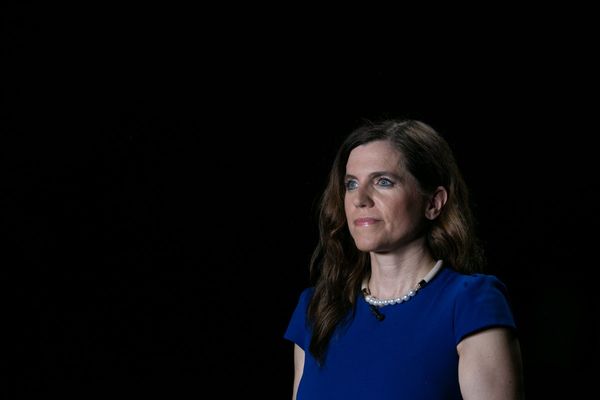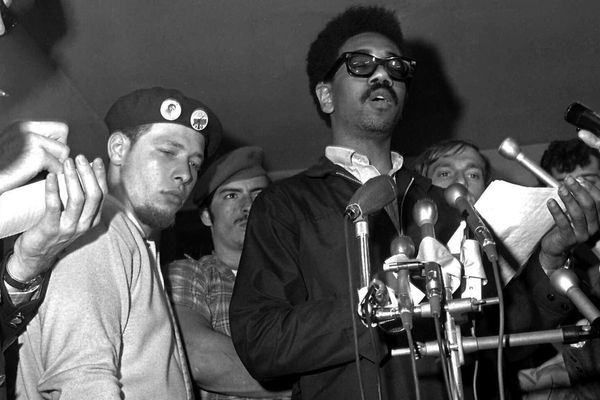ORLANDO, Fla. — As the involvement of so-called “ghost” candidates has sparked scandal in several of last year’s elections in Florida, a similar figure’s role in the race for Seminole County tax collector has attracted less scrutiny — even after the incumbent Joel Greenberg became a pariah at the center of a sprawling federal investigation.
Last June, a man who had previously worked with Greenberg on a voter initiative filed to enter the race using a nickname strikingly similar to Greenberg’s expected Democratic opponent.
Daniel Lee Day submitted election paperwork last year as “Dani Mora Day,” which Greenberg’s Democratic opponent Lynn “Moira” Dictor said appeared to be an attempt by a Greenberg ally to confuse voters. And although Day is a registered Republican, he filed as a candidate with no party affiliation (NPA).
Day, who could not be reached for comment, was one of several NPAs who filed to run in high-profile elections in Central and South Florida last year but didn’t campaign, sparking allegations they were propped up by outside groups as a way to siphon votes away from Democratic candidates.
Day’s unusual candidacy drew less attention than others because he ultimately quit the Tax Collector’s race — the same week Greenberg was indicted on federal stalking and identity theft charges, resigned his tax collector post and abandoned his reelection campaign.
By that point in the race, Greenberg had been accused of underhanded tactics targeting all three of the other candidates seeking to replace him, including Brian Beute, whom Greenberg is accused of targeting with a smear campaign by federal prosecutors.
Former longtime tax collector Ray Valdes, who Greenberg defeated in 2016 to take office, also accused Greenberg of attempting to coerce him into pressuring another rival candidate to leave the race.
That candidate, Republican J.R. Kroll, ultimately won the election after Greenberg was indicted and dropped out, emerging from an August primary and defeating Dictor with 54% of the November vote.
Pattern of similar tactics
Dictor, a radio personality who goes by Moira, said she thought Day filed to run under a name similar to hers because he wanted to siphon votes away from her and help Greenberg win reelection. Greenberg’s first term was marred by a series of scandals that created vulnerabilities for his reelection bid.
“No reasonable person would think this was a legitimate candidate,” Dictor said about Day, calling his entering the race a “poke in the eye” for her.
Day and Greenberg knew each other: Just two years earlier, they worked together on an initiative that sought to allow voters to elect a countywide mayor to oversee day-to-day operations and require Seminole’s five constitutional officers, including the tax collector, to serve independently from the commission.
And Day played a role in the 2016 race that made Greenberg Seminole’s tax collector and a rising star in Florida Republican politics, by enabling the 31-year-old political neophyte to face a longtime incumbent in a closed party primary.
The presence — and seemingly strategic use — of NPA candidates has become an enormous issue in Florida.
NPA candidates who did little fundraising and campaigning after filing to run last year in three hotly contested Florida Senate races, including a district that covers all of Seminole County, have recently received national attention.
Last month, Miami-Dade State Attorney Katherine Fernandez Rundle filed criminal charges against NPA candidate Alex Rodriguez and former state Sen. Frank Artiles, who is accused of paying Rodriguez nearly $45,000 to put his name on the ballot in an attempt to confuse voters and siphon votes from the Democratic incumbent, José Javier Rodríguez, who lost to Republican Ileana Garcia by 32 votes.
In Central Florida’s District 9, which includes Seminole County and part of Volusia, voters received mailers promoting Jestine Iannotti, a 35-year-old who registered as an NPA voter just days before filing to enter the race, and did no campaigning.
The political committee that paid for those flyers, a Winter Springs-based organization named The Truth, received all of its funding from the same dark money group that funded mailers promoting Rodriguez and another South Florida NPA candidate.
The Truth, which reported spending $180,000 on mailers promoting Iannotti, listed a box in a UPS store on Red Bug Lake Road as its main address on documents submitted to the state. Day listed a different box in the same store as his primary address on documents submitted to the Seminole County Supervisor of Elections Office.
U.S. Rep. Matt Gaetz, who is under federal investigation for accusations he had sex with a 17-year-old, also discussed putting a third-party candidate on the ballot in the District 9 race with lobbyist Chris Dorworth, another close associate of Greenberg, The New York Times reported earlier this month.
The Times reported the two hoped to help Republican Jason Brodeur, a former state representative and friend of both Gaetz and Dorworth, defeat Democrat Patricia Sigman. Dorworth said he didn’t remember the conversation and denied knowing Iannotti.
Artiles boasted about his involvement in the South Florida race at Brodeur’s election night party, the Miami Herald reported last year.
There’s no indication Day’s involvement in the tax collector race has drawn scrutiny from investigators. Seminole State Attorney Phil Archer, unlike Fernandez Rundle, has said in response to questions about the Iannotti race his office does not “conduct any criminal investigations of any type.”
Day closed primary in '16 race
On paper, Day and the NPA candidates who filed to run in the three Florida Senate races targeted by the dark money group appear to be unlikely candidates for elected offices.
All reported modest incomes and significant debt or past money problems, according to financial disclosure forms and court records. They have little or no past political experience and did no campaigning.
Day, who lives in Winter Springs, reported $20,000 in income in 2019 from a golf course in Oviedo, according to financial records he submitted when he filed to run for office last year.
The only contribution to Day’s campaign account in 2020 was a loan for $6,165 he made to himself on June 10, according to the Seminole County elections office. The previous year, a debt collection firm sued Day, saying he owed $1,353 in credit card charges. Last December, the firm was still seeking payment of the debt and a Seminole judge ordered Day’s employer, YWCA South Florida, to garnish his wages, court records show.
It wasn’t Day’s first run for Seminole tax collector. He’d also filed to run in the 2016 race — but as a write-in candidate.
That meant his name would not appear on the ballot, but his presence in the race triggered an infamous loophole in Florida elections, which closed off the August primary so that only registered Republicans could vote in the contest between Greenberg and Valdes, who had served in that role since 1989.
Greenberg, who was 31 at the time, received 52% of the vote to defeat Valdes, though only 39% of the county’s registered voters were eligible to cast ballots.
Day used his legal name “Daniel” and did not include the name “Mora” on his filing documents in 2016.
When Day qualified for the 2020 tax collector’s race, he submitted a screenshot of a Twitter account with the handle “@D_Mora_Day,” as evidence that he uses the nickname “Mora,” which also appears in the account’s profile and header images.
“D. Moralizer Day. AKA D. Mora,” the bio section of his profile reads. The account has tweeted four times since its creation in 2014.
Supervisor of Elections Chris Anderson, a former employee of Greenberg, said it’s not his role to determine the validity of nicknames that appear on ballots. If another candidate wants to challenge an opponent’s use of a name, they can do so through the court system or the Florida Elections Commission, he said.
Day, Dictor and Kroll all had to sign affidavits stating they are “generally known” by the nicknames they wanted to appear on ballots and they did not create them “to mislead voters,” he said.
Anderson worked for the tax collector’s office as the “chief investigations officer” from July 2017 until January 2019, when Gov. Ron DeSantis appointed him to serve as the county’s Supervisor of Elections.
Predecessor alleged ‘smear’ attempt
Suspicions about Day’s candidacy were overshadowed by the scheme that led to Greenberg’s arrest on stalking and identity theft charges, which included mailing false allegations about Beute to his employer and creating phony social media accounts in Beute’s name.
The criminal case snowballed to include charges from wire fraud to bribery of a public official, theft of government property and sex trafficking of a child, with authorities also investigating potential sex trafficking offenses by Gaetz, and also reviewing the alleged discussion Dorworth and Gaetz had about the District 9 race, according to reports.
But there was another allegation against Greenberg — targeting yet another of his reelection rivals, the eventual winner, J.R. Kroll — that went unnoticed amid the maelstrom.
The incident involved a wrongful termination lawsuit filed by three employees who had worked under Valdes but had been fired by Greenberg after he took office in 2017. As part of the suit, Greenberg’s attorneys subpoenaed Valdes with plans to depose him about controversies from Valdes’ time in office.
Valdes was fighting the subpoena, arguing that Greenberg wanted to “smear” him.
In a court filing, Valdes said he got a phone call on June 5, 2020, from Jim Stelling, a longtime Seminole Republican operative whom Greenberg had put on the Tax Collector’s Office payroll as a consultant on a real estate deal.
During that phone call, Valdes’ attorney later told the court, Stelling suggested Greenberg’s office could make the deposition “go away” if Valdes reached out to Kroll and persuaded him to drop out of the race.
“Mr. Stelling stated that he thought Mr. Kroll had an ‘uphill battle’ and asked if I would sit down to discuss Mr. Kroll because he thought I was close with Mr. Kroll’s campaign,” Valdes said in an affidavit. Valdes also said Stelling told him that he wanted to avoid an “ugly trial” in the wrongful termination suit and that Stelling did not want “to see this get messy.”
Attorneys for the Tax Collector’s Office later noted that Valdes’ affidavit stopped short of accusing Stelling of tying the resolution of the deposition issue to Valdes’ willingness to intervene in Kroll’s campaign. But Valdes’ lawyer, Cameron S. Frye, argued in a court filing that the purpose of the deposition fight was clear.
“The only reason Defendant seeks to depose Mr. Valdes is to create a side-show and hope that Mr. Valdes will ask Mr. Greenberg’s current political opponent to get out of the current race for Tax Collector,” he wrote.
Neither Valdes nor his attorney responded to requests for comment. But Stelling last week disputed Valdes’ version of events.
Stelling said Greenberg asked him to reach out to Valdes “to see if there was a middle ground to settle the lawsuit” but said he never brought up the 2020 election or asked Valdes to intervene with Kroll.
Asked why Greenberg would task one of his real estate consultants with trying to resolve a wrongful termination lawsuit, Stelling responded: “I don’t really know. It didn’t make sense then and it doesn’t make sense now.”







